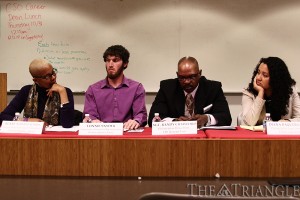The Women’s Law Society and the Family Law Society co-hosted a panel Oct. 28 of domestic violence experts at the Earle Mack School of Law. Panel members discussed past and current issues in domestic violence in honor of Domestic Violence Awareness Month.
Kim Hollenback of the Women’s Law Society kicked off the event by introducing each of the five panel members and explaining their experience in the field. Renee Norris-Jones, an advocate volunteer of Women Against Abuse, was joined by fellow member Lonnie Snyder, who serves as a community awareness representative with WAA. Also in attendance were Sgt. Randy Crawford, representing the Philadelphia Police Department; Diana Baquero of the Family Law Unit at Philadelphia Legal Assistance; and John Maxwell, an assistant teaching professor with a background in law enforcement.

“When I first got it, that paper felt like it was going to be a shield. I quickly found out that wasn’t the case,” Norris-Jones said.
Despite receiving a PFA, Norris-Jones’ husband continued to batter her, and the police did little to help. Crawford explained that the police response has evolved greatly since that time. In the event of a PFA violation, the police are required to arrest the batterer, making domestic violence a misdemeanors that can result in an arrest — even if the police weren’t a direct witness to the event.
Crawford also listed signs of a potential abuser and advice for women to avoid domestic violence. He said, “You can go out there and have fun, but you have to think.”
Having been in the field for a number of years, Crawford expressed his frustration with women who make excuses to stay in the abusive relationship. Norris-Jones replied that leaving an abuser is often a psychologically and financially difficult process. In her own situation, her family members accused her of abandoning her marriage, despite the injuries her husband had inflicted on her.
“In addition to needing the intestinal fortitude to go ahead with [leaving], sometimes your own family can actually be an impediment,” Maxwell said.
He went on to say that not leaving has consequences for other members of the family. Children of an abusive relationship may grow up to assume the roles of the batterer, for boys, or the victim, for girls.
Hollenback switched the conversation to the subject of domestic violence on the college campus. Snyder, a Drexel alumnus and former president of Drexel’s One in Four organization, explained that our own University lacks a dedicated infrastructure to support victims of domestic abuse. As for improvements to the legal system, Baquero explained that the enactment of Civil Gideon would help victims get greater access to lawyers.
After completing the set of prepared questions for the panel, Hollenback opened the floor for questions from the audience.
In the dessert reception that followed, audience members had the opportunity to interact with the panel members. Alisha Lubin, a second-year law student and president of the Women’s Law Society, commented on the success of the event. “It was important to us to bring awareness because we haven’t had a discussion about how we law students could get involved.”
Tamara Sharp, a second-year law student and president of the Family Law Society, added to this by saying, “I thought the panelists had great insight. The flow of conversation was really good.”

